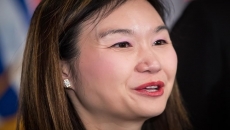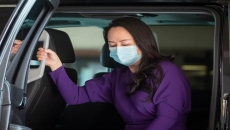Prime Minister Justin Trudeau will wait until an international summit with his democratic peers concludes before providing any details on how Canada will make up to 100 million vaccine doses available to countries not as flush with protection against COVID-19.
Trudeau himself hasn't confirmed details on how it will get shots to more parts of the world, given how it's wealthy nations leading the worldwide vaccination campaign.
On Friday, he met with British Prime Minister Boris Johnson in his first official sit-down with a world leader at the G7 Leaders' Summit.
Posing for photographers and journalists, the pair stood smiling elbow-to-elbow, with Johnson flashing a thumbs up before their meeting started.
Sat down with @BorisJohnson at the @G7 to go over our shared priorities - like creating jobs, the economic recovery, delivering vaccines worldwide, advancing gender equality, taking climate action - and what we can do together to make progress on them. https://t.co/WbFSNvTqow pic.twitter.com/3tSWrzzvT1
— Justin Trudeau (@JustinTrudeau) June 11, 2021
Even before they sat down, Johnson made it clear what he wants to see from his G7 colleagues.
The day before, he pledged that over the next year, the United Kingdom would be donating at least 100 million of its surplus shots.
Johnson, as host of the summit, also expects other leaders to contribute doses, money, or both to provide the rest of the world with one billion shots in hopes that ends the pandemic next year.
And it seems Canada is listening.
In discussing the conversation between Trudeau and Johnson, Canada's high commissioner the United Kingdom confirmed it would contribute "up to" 100 million doses to the global vaccination effort.
"That will be a combination of some in cash and some in-kind. The full breakdown will be available on Sunday," said Ralph Goodale, a longtime MP and former cabinet minister in Trudeau's government.
"But Canada's global number is up to 100 million."
Bob Rae, Canada’s ambassador to the United Nations — a former interim Liberal leader — recently underlined to a Senate committee the importance of COVAX, an initiative designed to get vaccines to 92 middle and low-income nations, and the urgency to get more countries vaccinated, by pointing to the catastrophe the more transmissible Delta variant caused in India.
A Canadian government official, speaking on the condition of anonymity, said the country's offer also includes what it bought for others in vaccine sharing initiatives.
It has already committed millions to different programs designed to increase vaccine access, as well as delivery and distribution.
Last week alone, Canada announced it was doubling its direct cash donation to COVAX to buy doses for developing countries, from $220 million to $440 million.
Dr. Howard Njoo, Canada's deputy chief public health officer, said at a COVID-19 briefing Friday that the country can "walk and chew gum at the same time" when it comes to protecting its population and helping to vaccinate the world.
"It's not one or the other. Both things are happening at the same time," he said.
Joelle Paquette, a director at Procurement Canada, added Canada has secured 400 million doses of vaccine and vaccine candidates so it is possible for the country to share doses.
"I also want to just assure you that it will not impact our objective of fully vaccinating all Canadians by the end of September," she said.
Dr. Srinivas Murthy, a critical care pediatric specialist in Vancouver with a research focus on pandemic preparedness, said in a recent interview that the focus on donating money is a bit of a smoke screen for not sharing actual vaccines.
He said COVAX will need more money to buy doses, but there aren’t trucks full of doses just sitting waiting for a buyer.
“Obviously, they need more money to buy more doses from the main companies, but it's vaccines, not money at this point in the pandemic that's required globally.”
Besides COVID-19, trade and the economy are top of mind issues for the leaders.
The leaders agreed a comprehensive Free Trade Agreement between the U.K. and Canada would unlock huge opportunities for both of our countries. They agreed to redouble their efforts to secure an FTA as soon as possible," according to a readout of their conversation from the U.K.'s High Commission in Canada.
"They discussed a number of foreign policy issues including China and Iran. The prime minister thanked Prime Minister Trudeau for Canada’s leadership on the international response following the downing of the Ukraine International Airlines plane in Tehran last year."
Trudeau started his Friday not with another G7 leader, but in a virtual audience with Queen Elizabeth.
Goodale said they discussed the logistics of appointing a new governor general, as well as a First Nation's recent discovery of what are believed to be the unmarked graves of 215 Indigenous children at a former residential school, and targeted killing of a Muslin family.
On Friday, Trudeau also made his first public appearance alongside Biden since he was elected to the White House last fall, when all the leaders posed for a group photo along a beach.
The pair didn't say much to each other, if anything, while posing for cameras and journalists. Trudeau mostly kept to himself while the leaders made their public appearances.
They all sat down together later that afternoon to be part of a session focused how the health and economic recovery from COVID-19 can be "for all."






